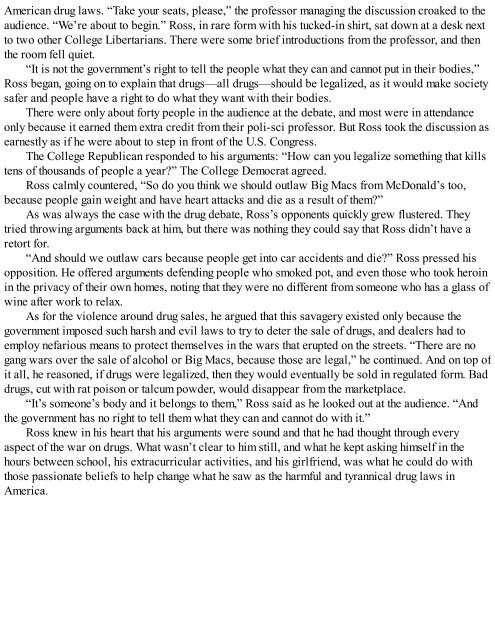- Page 3 and 4: Portfolio/Penguin An imprint of Pen
- Page 5 and 6: No man, for any considerable period
- Page 7 and 8: 20. The Dread Pirate Roberts 21. Ca
- Page 9 and 10: Author’s Note My mother, who pass
- Page 11 and 12: PART I
- Page 13 and 14: look for anything out of the ordina
- Page 15 and 16: pills that had been arriving, week
- Page 17 and 18: Five Years Earlier
- Page 19 and 20: hand in marriage (Say yes, please s
- Page 21 and 22: Chapter 3 JULIA VIE Julia Vie’s f
- Page 23: “Oh, no, no, no,” Julia said as
- Page 27 and 28: His hope was that this gig would le
- Page 29 and 30: Chapter 6 THE BONFIRE Ross swerved
- Page 31 and 32: As they joined the group around the
- Page 33 and 34: Chapter 7 THE SILK ROAD Stuff, to R
- Page 35 and 36: computer screen, he daydreamed that
- Page 37 and 38: to push Ross’s intelligence, with
- Page 39 and 40: “We should go,” he said to Juli
- Page 41 and 42: at the University of Texas, and ask
- Page 43 and 44: Chapter 10 WHAT GOES UP MUST COME D
- Page 45 and 46: Now, rather than split his time amo
- Page 47 and 48: enough, someone was. You could buy
- Page 49 and 50: Chapter 12 A BULL’S-EYE ON MY BAC
- Page 51 and 52: transaction. This would require rew
- Page 53 and 54: libertarian theory. When the tête-
- Page 55 and 56: Chapter 14 WHAT HAVE YOU DONE?! Tea
- Page 57 and 58: Chapter 15 JARED AND THE FIFTY-TON
- Page 59 and 60: themselves. The issue, Jared reiter
- Page 61 and 62: A few days before he left for Austr
- Page 63 and 64: Chapter 17 CARL FORCE’S TOMORROW
- Page 65 and 66: Carl thought about it for a moment.
- Page 67 and 68: Ross interacted with dozens of diff
- Page 69 and 70: caught up in the conversation to se
- Page 71 and 72: Then there was the challenge of buy
- Page 73 and 74: Chapter 20 THE DREAD PIRATE ROBERTS
- Page 75 and 76:
What a brilliant idea. Ross loved i
- Page 77 and 78:
He soon realized that this site cou
- Page 79 and 80:
people, the risk was worth the rewa
- Page 81 and 82:
Ross’s cut from the commission fe
- Page 83 and 84:
Chapter 24 CARL, ELADIO, AND NOB Fo
- Page 85 and 86:
Chapter 25 JARED’S CHICAGO VERSUS
- Page 87 and 88:
The Baltimore attorney then explain
- Page 89 and 90:
commission,” Ross wrote in a lett
- Page 91 and 92:
world businesses when a CEO is oust
- Page 93 and 94:
Nope. Not going to happen. Carl had
- Page 95 and 96:
This place was special to Ross for
- Page 97 and 98:
Chapter 29 VARIETY JONES GOES TO SC
- Page 99 and 100:
him break a drug dependency, and en
- Page 101 and 102:
But if Ross wanted to keep growing
- Page 103 and 104:
Chapter 31 ROSS SILENCES JULIA Ross
- Page 105 and 106:
away. Heading into the darkness, al
- Page 107 and 108:
Chapter 32 CHRIS TARBELL, FBI A que
- Page 109 and 110:
took his SATs in high school he did
- Page 111 and 112:
After breakfast each morning, while
- Page 113 and 114:
other start-up in the city would ha
- Page 115 and 116:
There were two main aspects of the
- Page 117 and 118:
Chapter 35 BATTEN DOWN THE HATCHES!
- Page 119 and 120:
For the backup plan to the backup p
- Page 121 and 122:
the site had grown, DPR’s message
- Page 123 and 124:
This wasn’t a vacation. It was hi
- Page 125 and 126:
When his new friends asked Ross wha
- Page 127 and 128:
Chapter 38 CARL LIKES DPR On paper
- Page 129 and 130:
are safe from the laws of your nati
- Page 131 and 132:
Chapter 39 KIDNEY FOR SALE! Ross st
- Page 133 and 134:
On the black market a person’s ki
- Page 135 and 136:
Chapter 40 THE WHITE HOUSE IN UTAH
- Page 137 and 138:
pup, tried to bite another agent’
- Page 139 and 140:
Chihuahuas. Green went on like a sc
- Page 141 and 142:
Chapter 42 THE FIRST MURDER Ross ha
- Page 143 and 144:
started to wonder if he might not h
- Page 145 and 146:
usts with physical drugs, not digit
- Page 147 and 148:
Portland, looked like she was going
- Page 149 and 150:
into the hospital room as they wept
- Page 151 and 152:
Chapter 45 GARY ALFORD, IRS The sid
- Page 153 and 154:
He started with the Gawker article,
- Page 155 and 156:
It was, after all, his legacy, the
- Page 157 and 158:
Chapter 47 GARY’S BIG CHANGE Ever
- Page 159 and 160:
to go and feed a parking meter. So
- Page 161 and 162:
you were only giving them half of y
- Page 163 and 164:
“Let me tell you a little parable
- Page 165 and 166:
your side” capacity—tried to wa
- Page 167 and 168:
Chapter 50 A PARKING TICKET ON THE
- Page 169 and 170:
Another search showed that Ross Ulb
- Page 171 and 172:
unclear what, if anything, was on t
- Page 173 and 174:
Chapter 52
- Page 175 and 176:
take a few breaks to watch Louis C.
- Page 177 and 178:
The agent asked again. “Andrew Fo
- Page 179 and 180:
Chris Tarbell had decided he wouldn
- Page 181 and 182:
By the end of Jared’s presentatio
- Page 183 and 184:
Chapter 54 JARED BECOMES CIRRUS Whe
- Page 185 and 186:
plastic. When the woman from Texas
- Page 187 and 188:
Chapter 55 JULIA IS SAVED! HALLELUJ
- Page 189 and 190:
Chapter 56
- Page 191 and 192:
Dylan waited for Ross to respond, b
- Page 193 and 194:
Chapter 57 ONWARD TO FEDERAL PLAZA
- Page 195 and 196:
Angels to have people killed, and h
- Page 197 and 198:
Chapter 58 JULIA COMES TO SAN FRANC
- Page 199 and 200:
She nonchalantly came up the stairs
- Page 201 and 202:
“We’re going to read from the T
- Page 203 and 204:
Chapter 60 THE PHONE CALL Gary sat
- Page 205 and 206:
She turned back to her computer and
- Page 207 and 208:
Dread Pirate Roberts was a twenty-n
- Page 209 and 210:
caught in a tree in the park and ha
- Page 211 and 212:
Chapter 62 THE PINK SUNSET Pink. Th
- Page 213 and 214:
was logged in to the site and arres
- Page 215 and 216:
even stop crossing the line, Carl d
- Page 217 and 218:
Even if anyone had noticed the SUV
- Page 219 and 220:
laptop and find a spot in a cafe wh
- Page 221 and 222:
“Sure,” DPR wrote. “Let me lo
- Page 223 and 224:
“I am Special Agent Chris Tarbell
- Page 225 and 226:
Thom and the other agent started ch
- Page 227 and 228:
And then there was Julia, who had p
- Page 229 and 230:
Chapter 68 UNITED STATES OF AMERICA
- Page 231 and 232:
The defense knew an insurmountable
- Page 233 and 234:
He continued walking through the sp
- Page 235 and 236:
man. Gravity doesn’t care if you
- Page 237 and 238:
Chapter 71 THE PLURAL OF MONGOOSE I
- Page 239 and 240:
Chapter 72 THE MUSEUM Along Pennsyl
- Page 241 and 242:
high school, René, about their fut
- Page 243 and 244:
the perils lovingly and yet resolut
- Page 245 and 246:
For over a year after the Silk Road
- Page 247 and 248:
Young Ross in elementary school in
- Page 249 and 250:
Ross with his parents, Lyn and Kirk
- Page 251 and 252:
The NOMMO Club at Penn State Univer
- Page 253 and 254:
The Silk Road Web site, which offer
- Page 255 and 256:
Jared Der-Yeghiayan of the Departme
- Page 257 and 258:
Force disguised as Nob, his online
- Page 259 and 260:
Chris Tarbell of the Federal Bureau
- Page 261 and 262:
Curtis Green, known on the Silk Roa
- Page 263 and 264:
Curtis Green’s staged murder, an
- Page 265 and 266:
Notes on Reporting Each and every d
- Page 267 and 268:
Acknowledgments I’d like to start
- Page 269 and 270:
Bibliography Bauer, Alex. “My Roo
- Page 271:
What’s next on your reading list?

















